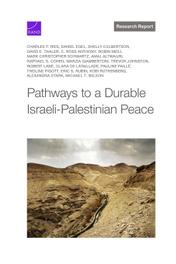Pathways to a Durable Israeli-Palestinian Peace
ResearchPublished Jan 28, 2025
The authors of this report examined whether the basis for a durable peace between Israelis and Palestinians might yet be found. They analyzed the factors that have made this conflict historically so hard to solve and drew insights from other conflicts. They also created a possible road map to a durable peace, involving security, governance, economic, physical and social, and international initiatives.
ResearchPublished Jan 28, 2025

The authors examine the possibility that the extraordinary costs and destructiveness of the present Israeli-Palestinian conflict could demonstrate to all the urgent need for a path to a durable peace. The authors consider the history of this asymmetrical conflict; identify lessons from attempts to resolve other thorny conflicts; and set out a road map with short-, medium-, and long-term security, governance, economic, physical and social, and international pathways to such a peace.
Three characteristics have made this conflict especially difficult to resolve: (1) There are few credible Israeli or Palestinian partners to exert leadership for peace; (2) the territorial claims of both sides are incompatible; and (3) the conflict has attracted much international involvement, not always in support of compromise and peace.
The case studies highlight the importance of individual leaders' personal and political commitment to peace and the role of outside individuals. Leaders who can declare that it is time to explore peace can make a dramatic difference. There are also possible advantages of international pressure, even if the two sides are still far apart.
The road map to a durable peace is framed around the destination of a "second state" for the Palestinians. The prerequisites require credible leadership from all sides dedicated to peace. Success would be transformative for the region, its peoples, and the wider world. The benefits include restored security for Israelis and Palestinians, a new construct for Palestinian governance over the longer term, and economic and social revival for Gazans and Palestinians in the West Bank.
Funding for this research was provided by gifts from RAND supporters and income from operations and conducted within the International Security and Defense Policy Program of the RAND National Security Research Division.
This publication is part of the RAND research report series. Research reports present research findings and objective analysis that address the challenges facing the public and private sectors. All RAND research reports undergo rigorous peer review to ensure high standards for research quality and objectivity.
This document and trademark(s) contained herein are protected by law. This representation of RAND intellectual property is provided for noncommercial use only. Unauthorized posting of this publication online is prohibited; linking directly to this product page is encouraged. Permission is required from RAND to reproduce, or reuse in another form, any of its research documents for commercial purposes. For information on reprint and reuse permissions, please visit www.rand.org/pubs/permissions.
RAND is a nonprofit institution that helps improve policy and decisionmaking through research and analysis. RAND's publications do not necessarily reflect the opinions of its research clients and sponsors.